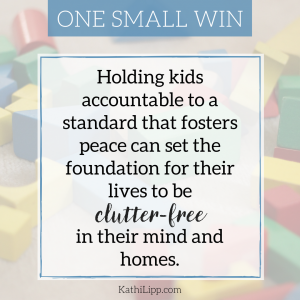
by kathilipp | May 22, 2017 | God, Guest Blog, tips and ideas |

Have you ever been frozen in indecision, wondering what to do next?
Me too. There are so many demand on us, it becomes harder and harder to stay true to our priorities. Sometimes it’s even hard to identify our priorities.
Maybe you ask yourself, what does God really want me to do? Especially when there are so many important needs out there.
If you can relate to that question, you’re not alone. There’s been a shift in society that’s silently affecting our ability to identify what’s most important. As I’ve traced this issue back a few years, the confusion seems to have started with email and accelerated with our cell phones.
Let me back up, and try to explain.
The growing competition on our priorities
Growing up, my family had a house phone. Just one. And it was connected to the wall with a cord. There was no call-waiting beep or answering machine. And of course, no email or texting. So if you wanted to reach me, you kept calling until you got through. Or maybe head to my house and actually knock on my door. Quite frustrating when “someone” spent hours talking to a friend!
Basically, the burden to communicate was on the person with the message to share.
Today the responsibility to communicate has shifted. No longer is it your burden to reach me; all you do is type-type-type a message, hit send and all the responsibility floats through cyberspace and lands firmly on me.
Multiply this by every which way people can reach me, and before I even wake up, I’m behind.
Starting out behind
This shift has silently affected all of us. A typical day starts with checking some sort of communication device to see who might have emailed, posted or texted. Then, before we begin to handle what’s most important to us, our day begins by responding to what’s most important to others.
Without a concerted effort to stop this pull, we are drawn into the day’s rushing current like a tiny raft on a whitewater river. And rather than being proactive, our days are spent in reactive mode.
Sound familiar? If so, you’ve probably also experienced the too-long to-do list that comes with it. After we’ve given the best of our time and energy to others, there’s little left to address God’s priorities for us. Consequently we put-off, delay and procrastinate our priorities.
After years of shortchanging myself and my family, and often dishonoring God, I realized I had things upside down! Things that mattered least replaced things that mattered most in my schedule. And work that would make the greatest impact on my life often fell to the bottom of my lists, then transferred to the next list until I either completed it with a fraction of my ability or abandoned it entirely.
Sometimes it’s nearly impossible to figure out our best work. It sounds so easy to say, “Identify your priorities, and do those first.” However, when we face multiple demands we can often feel helpless. And helplessness can lead us to escape, avoid or try and numb.
Pressing pause and reevaluating priorities
When those feelings start to overtake me and I don’t know what to do, rather than make a self-defeating choice, it’s time to press pause. Sometimes, the best thing to do is nothing … except seek direction and wisdom from the One who knows what our best is.
Given the chance, others will set our priorities for us. Yet God specifically has a calling for each of us that will only come from Him. To discern this, we need wisdom. Without God’s wisdom, we make decisions on facts and feelings. And the fact that I have 100 emails to answer and feel overwhelmed does not mean it’s wise to do so now.
To find wisdom, I need to silence the demands of many, to hear the commands of One.
God is faithful, and His Word promises we can receive wisdom. In fact, it’s a gift from God.
If any of you lacks wisdom, you should ask God, who gives generously to all without finding fault, and it will be given to you.” (James 1:5)
As my life becomes more interconnected with others, my priorities are harder to identify. There will always be new demands rising to the tops of my to-do list, giving me reasons to delay tackling my own priorities.
There is hope. When we take our tiny raft out of the raging river, and sit on the banks with our Heavenly Father, He will give us wisdom for what to do next. Sometimes it’s answering an email, but it might be something else He has planned for today.

 Glynnis Whitwer is a wife, mother of five young adults and executive director of communications for Proverbs 31 Ministries. Her latest book, Taming the To-Do List: How to Choose Your Best Work Every Day, is available through Proverbs 31 Ministries or wherever books are sold. Her next book releases July 4, 2017, and is called Doing Busy Better. Pre-order here. You can connect with Glynnis on her website: GlynnisWhitwer.com.
Glynnis Whitwer is a wife, mother of five young adults and executive director of communications for Proverbs 31 Ministries. Her latest book, Taming the To-Do List: How to Choose Your Best Work Every Day, is available through Proverbs 31 Ministries or wherever books are sold. Her next book releases July 4, 2017, and is called Doing Busy Better. Pre-order here. You can connect with Glynnis on her website: GlynnisWhitwer.com.

by kathilipp | May 18, 2017 | Guest Blog, Me |

My first child’s high school graduation brought up a whole new set of fears and stress in me. Have I done enough to prepare her for adulthood? Will she make wise choices as she steps out from under our roof and into a world full of options? Will she be able to hold onto her faith in college—at a time when many young people discard theirs?
Her graduation felt like a defining moment in my parenting. I knew I’d done all I could to train her well, to prepare her for success. But now, facing what felt like a Parenting 101 Final Exam, the stakes were high. I didn’t want to fail. I certainly didn’t want my precious daughter to fail.
This tension bubbled up in the days leading to her graduation. Of course, she was dealing with her own emotions surrounding this milestone event and pulling away from me, busy preparing for adventures to come. I was grieving the upcoming loss of her daily presence, knowing before long she would move from our house and pursue her education.
The entire month before graduation was crammed with activity. Prom, sports banquets, end-of-the-year awards, ceremony rehearsals, all mixed into a swirling vortex of angst. So many events, so many decisions.
As graduation neared, our relationship, normally characterized by mutual love, respect, and lots of laughter, became contentious. This culminated in an angry verbal exchange as we walked through the campus parking lot on our way into her Baccalaureate ceremony. I can’t remember what precipitated the argument, but I remember how I felt. Off-balance. Overwhelmed. Defeated.
I had let stress and fear steal my joy.
Have you ever experienced relational stress leading up to a milestone event? Have you allowed that stress to ruin the event for you? For your child?
Heightened emotions come with any life-changing event, but we don’t have to let them rob us of the joy of the occasion, whether it’s a move, graduation, wedding, or some other major event. We can have fun and create precious memories without regret.
When approaching a big event in your child’s life, you don’t have to get caught up in the swirling emotional vortex. You can cultivate peace through journaling or talking with a trusted friend. Speak with a life coach, counselor, pastor or mentor. Talking through fears and concerns with a mom who’s walked the path before you might mean the difference between white-knuckling it through the milestone and really enjoying it.
One of the most important things we can do to maintain our equilibrium during these emotional times is to get alone with God and pour out our hearts to Him.
Jesus demonstrated the importance of getting alone with the Father before ministry. “But Jesus often withdrew to lonely places and prayed” (Luke 5:16). As we prepare to minister to our children during their “big day” we can follow Jesus’ example.
Last year my son graduated and this year my youngest daughter will graduate. I’ve learned a lot going through this letting-go process. I’ve learned to be intentional about processing my emotions. I’ve learned to carve out time in the busyness to be alone in the healing presence of my Father.
Are you facing a milestone event?
If so, how will you cultivate peace and plan for fun as you prepare for the event?
 Elizabeth M. Thompson is a writer and speaker who loves helping women develop meaningful spiritual lives. She and her husband have three children and will soon be empty-nesters. They live, bike, kayak, and hike along the American River near Sacramento, CA. Prayer is her passion. For a free download of “Jumpstart Your Stalled Prayer Life” go to her website: www.ElizabethMThompson.com.
Elizabeth M. Thompson is a writer and speaker who loves helping women develop meaningful spiritual lives. She and her husband have three children and will soon be empty-nesters. They live, bike, kayak, and hike along the American River near Sacramento, CA. Prayer is her passion. For a free download of “Jumpstart Your Stalled Prayer Life” go to her website: www.ElizabethMThompson.com.

by Guest Blogger | Apr 18, 2017 | Guest Blog, tips and ideas |

Have you ever thought, “We should eat out less often — for the sake of our wallets and our waistlines!” Maybe you tried tracking your purchases, keeping almonds in our purses, and beating yourself up. But nothing ever seems to work. What if I told you I could eat out and save money?
A restaurant tax
I decided to do something drastic. I instituted a surcharge for each meal I didn’t make at home. It was a bold move, but I can do anything for a month, right?
I told myself I could eat out or order in as often as I wanted, guilt-free. However, as long as each time I did, I tucked away an equivalent amount of money in a special envelope.
- A $10 trip to the Burger House now cost me $20.
- Thai food for the family meant spending $90 instead of $45.
- And a frou-frou coffee drink was $8, not $4.
To keep myself honest, I imposed a non-negotiable rule: my “tax” was due at the time service was rendered. If I didn’t have the cash to put into my envelope immediately, I couldn’t place my order. It’s difficult enough scrounging through the nooks and crannies of my purse and minivan to find money for a burger on the run. But now I had to find twice as much.
I assumed this experiment would drastically reduce how frequently I ate out, because eating out is expensive, and I had just doubled the cost.
A surprising result
At the end of the month, I removed the bulging envelope from my desk drawer and held the stack of small bills in my hand, curious to see how much I had collected. My heart beat faster as I counted: $185, $190 — I was holding over $200! A mix of emotions swirled to the surface.
Embarrassment — Do we really eat out this much?
Shame — How did this not “cure” me of eating out?
Concern — Had I forgotten to pay a bill?
But those emotions were eclipsed by excitement: We spent $200 eating out last month AND we had an additional $200 saved!!
That means, at least for last month, I could have spent $400 in some other way, if I had chosen not to eat out at all. At the very least, I had $200 in my hand that I could still choose to spend intentionally. The options were endless — all because my experiment failed!
Or had it?
Spending money intentionally
How much money do you spend eating out each month? Is there something you could spend that money on that would give you more satisfaction? Maybe. Or maybe not. How will you know if you’re not intentional?

One Small Win: Try imposing your own restaurant tax. You may eat out less frequently. You may eat out just as often. At least you’ll be making an informed decision. Either way, you’ll gather far more money than you’ll ever find by foraging through your car.
 Kendra Burrows has a passion for tending her earthly and spiritual gardens. Some days they overflow with blooms, other days the weeds seem to prevail. In either case, Kendra strives to mindfully recognize God’s grace in her life every day, and to encourage others to tend and nurture their own beautiful gardens.
Kendra Burrows has a passion for tending her earthly and spiritual gardens. Some days they overflow with blooms, other days the weeds seem to prevail. In either case, Kendra strives to mindfully recognize God’s grace in her life every day, and to encourage others to tend and nurture their own beautiful gardens.
Kendra is joyfully married with three great kids and son-in-law, and two other lovable nuisances (pets). She lives in Eugene, OR, and teaches psychology at the local college.
Connect with Kendra at www.kendraburrows.com.

by Guest Blogger | Apr 12, 2017 | Guest Blog, tips and ideas |

I love the idea of dinner—the coming together for conversation, connection, and a shared table. I like the idea of food and conversation happening around the kitchen table, filling both our stomachs and our hearts. The idea of roasted chicken, fresh from the oven, mashed potatoes, and fresh green beans displayed on an impeccable table with candles glowing makes my heart sing.
That’s just not what dinner looks like at my house.
What my dinner table really looks like
Allow me to set the stage. It is 6:00 pm. It is the “losing it hour.” It is the end of the day and everyone is tired and hungry. The rotisserie chicken from the grocery store is trying to stay warm in the oven without drying out while I warm up the leftover rice and defrost some green beans that have just a touch of freezer burn. The table is littered with crumbs, scraps of paper, and eraser bits. I sit the food on top of it all so we can just eat already. My husband arrives home from a long day and, well, we’ve all had a long day.
We pray and begin to eat. And so it begins. Someone is chewing too loudly. There’s too much lemon pepper seasoning on the green beans. “She looked at me funny” is a constant refrain. Our questions about school end up with answers like, “We did math” and “I liked recess.”
At your house maybe the baby is throwing food and refusing to eat or maybe you are still waiting for the tardy teen to arrive. It is always something. Dinner is burned, attitudes are keeping things lively, or the disagreement from the morning has decided to return for the “losing it hour.” And on a really great night you get all three!
Invite joy to the table – a new way to do dinner
I am on a mission to rescue dinner from unrealistic expectations. My goal is smiles and the rest is just details. To begin this mission I bought three tins of jokes. I wanted to introduce a different expectation—one of connection through fun—and, at the very least, keep the grumpy at bay. For the most part it has worked. The eraser bits are still on the table, the chicken is dry, but we have smiles! About a week after starting this new way of dining my son checked out a book of jokes from the school library for us to enjoy at dinner. I call that winning!
Rescuing dinner from expectations has led to dinners full of fun. Grumpy still joins us for dinner every now and then of course, but we’ve stopped setting a place for him and instead have invited joy to the table.
Here’s a few more ideas, some I have tried and some I will implement soon to give grumpy the boot and invite joy to a place at our table.
– On Sunday nights we watch America’s Funniest Videos while we eat an easy dinner. There is always belly laughter and I LOVE IT.
– Grab some trivia cards from a board game and just ask the questions – no pieces or game board needed.
– Serve dinner that is only finger food – easy for the one prepping and fun for all.
– Buy or make some fun placemats.
– Speak with accents.
– Eat dinner with chopsticks. (Make chopsticks easy for kids to try with this tutorial! http://www.instructables.com/id/Chopstick-trainer-with-only-a-rubber-band-and-ch/)
– Turn on some music and allow it to set the tone for your meal. Are you having Mexican? Turn on some Latin tunes. Having grilled cheese for dinner? Jazz genre, of course. Have throwback night and introduce your kids to the music you listened to growing up.
– Eat a picnic on the living room floor.
One small win: Make dinner fun again by releasing your expectations. Introduce fun at dinner tonight in a way that your family will enjoy. Invite joy to the table.

 You can read more from Bethany Howard at bethanyhoward.com. She writes about finding fuel for joy and growth in the details of the daily. Her greatest leadership exercise has been her roles as wife and mom to three. She is a graduate of Leverage: The Speaker Conference.
You can read more from Bethany Howard at bethanyhoward.com. She writes about finding fuel for joy and growth in the details of the daily. Her greatest leadership exercise has been her roles as wife and mom to three. She is a graduate of Leverage: The Speaker Conference.

by Guest Blogger | Apr 5, 2017 | Clutter Free, Guest Blog |
Taming the paper piles
Paper, paper everywhere! Do you have more paper piles in the form of mail, bills, and notes than you know what to do with? Amy has a simple system to help you tame the paper monster.
Today Amy shows you her notebook system she’s used for several years to help tame the paper piles. It was especially helpful when her kids were small, but even now she uses it to organize papers and keep everything she needs at her fingertips.
One Small Win: Make a family notebook to corral your papers.

Amy Carroll is a speaker, writer, and International Initiatives Coordinator with Proverbs 31 Ministries. She’s the author of Breaking Up with Perfect as well as the director and coach of Next Step Speaker Services. Amy and her husband live in lovely Holly Springs, NC with a bossy miniature dachshund. You can find her on any given day texting her two sons at college, typing at her computer, reading a book, or trying to figure out one more alternative to cooking dinner.
Share life with Amy at www.amycarroll.org

by Guest Blogger | Mar 23, 2017 | Guest Blog |

I can just hear you now: “Clutter-free” and “parenting” in the same sentence? For real?
Well, not so fast. Clutter-free parenting is not a one-and-done proposition. When my children were little, I took delight in the nice, neat shelves in my basement, holding up totes clearly marked with clothing sizes. I was also Y2K ready (dating myself here), and had organized shelving stocked fully with massive quantities of food for pending disaster, enough to feed a small country. Yes, some of you are judging me right now while others are in awe.
Okay, so I have my skeletons in the closet of overdoing things when it comes to organization. I readily admit that maybe, just maybe, my focus on being clutter-free and organized bordered on being a little neurotic. Notice the past tense in that last sentence.
Clutter-free parenting as your kids grow older
Making five little people do their chores was stressful, but it does not compare with four college kids who all have jobs and school and a creative twelve-year-old who reenacts Curious George episodes again and again. Somehow the college “adult” status has a built-in entitlement that they just simply cannot do chores nor participate in the clutter-free schooling environment of days gone by.
A little background might help here. I home-educated all of my children all the way through. Yep. I am one of those. I delighted in purchasing books – LOTS of them – and organizing it all. Until … Until our lives were interrupted by a tragedy that transformed our very existence.
Suddenly the pet peeves about clutter really did not matter anymore. Just making my kids happy, just surviving, just trying to maintain some level of cleanliness, that’s where my focus shifted.
Balancing compassion and expectations
The problem with that state of living is that if we aren’t careful, it becomes our new norm. Kids are smart and realize this. The compassionate heart of mommas can, um, enable their disobedient behavior with excuses. I confess I have done this many times. I rationalized in my brain that it was cruel to stress them out with the burden of having to actually chip in around the house. They had a past pain that somehow overruled maintaining a clutter-free zone.
Now I have four kids, all with jobs and in college. “I’m an adult now,” several of my children have informed me. I mused over what those words meant as college textbooks were scattered all over my dining room table, kitchen table, coffee table, well, actually EVERYWHERE! “Mom, I have to work.” “I don’t have time to rinse the plate off.” “Gotta go.” The enabling side of me felt compassionately that it was just too hard for them to be expected to do 5-10 minutes of chores. They were stressed. But then, so was I. I work too.
The climb back to a clutter-free zone with children is not completely victorious. We fail and sometimes give ourselves space and grace when times get really hectic. But we don’t stay there.
When I am tempted to feel guilty and mean about expecting children who live in our home to pitch in, I am reminded that allowing clutter to reign in our lives and in the lives of our children is actually not kind.
One Small Win: Holding kids accountable to a standard that fosters peace can set the foundation for their lives to be clutter-free in their mind and homes.
So to our children who are now young adults, my husband says, “You’re right – you’re an adult now . . . act like it!”
“A servant pampered from childhood will become a rebel.” Proverbs 29:21

 Denise Pass is an author, CCM artist, worship leader and speaker from Fredericksburg, VA, where she lives with her amazing husband and five children. Denise is passionate about writing devotions and music that foster unshakable hope and healing in the face of seemingly insurmountable circumstances. Her ministry, Seeing Deep in a Shallow World seeks to be a compass grounded in Scripture and a place where real problems meet real, transparent faith and needed answers in Scripture.
Denise Pass is an author, CCM artist, worship leader and speaker from Fredericksburg, VA, where she lives with her amazing husband and five children. Denise is passionate about writing devotions and music that foster unshakable hope and healing in the face of seemingly insurmountable circumstances. Her ministry, Seeing Deep in a Shallow World seeks to be a compass grounded in Scripture and a place where real problems meet real, transparent faith and needed answers in Scripture.
You can read more about Denise’s ministry, Seeing Deep, over at www.denisepass.com or connect with her on Facebook and Twitter.

 Glynnis Whitwer is a wife, mother of five young adults and executive director of communications for Proverbs 31 Ministries. Her latest book, Taming the To-Do List: How to Choose Your Best Work Every Day, is available through Proverbs 31 Ministries or wherever books are sold. Her next book releases July 4, 2017, and is called Doing Busy Better. Pre-order here. You can connect with Glynnis on her website: GlynnisWhitwer.com.
Glynnis Whitwer is a wife, mother of five young adults and executive director of communications for Proverbs 31 Ministries. Her latest book, Taming the To-Do List: How to Choose Your Best Work Every Day, is available through Proverbs 31 Ministries or wherever books are sold. Her next book releases July 4, 2017, and is called Doing Busy Better. Pre-order here. You can connect with Glynnis on her website: GlynnisWhitwer.com.

 Elizabeth M. Thompson is a writer and speaker who loves helping women develop meaningful spiritual lives. She and her husband have three children and will soon be empty-nesters. They live, bike, kayak, and hike along the American River near Sacramento, CA. Prayer is her passion. For a free download of “Jumpstart Your Stalled Prayer Life” go to her website:
Elizabeth M. Thompson is a writer and speaker who loves helping women develop meaningful spiritual lives. She and her husband have three children and will soon be empty-nesters. They live, bike, kayak, and hike along the American River near Sacramento, CA. Prayer is her passion. For a free download of “Jumpstart Your Stalled Prayer Life” go to her website: 


 Kendra Burrows has a passion for tending her earthly and spiritual gardens. Some days they overflow with blooms, other days the weeds seem to prevail. In either case, Kendra strives to mindfully recognize God’s grace in her life every day, and to encourage others to tend and nurture their own beautiful gardens.
Kendra Burrows has a passion for tending her earthly and spiritual gardens. Some days they overflow with blooms, other days the weeds seem to prevail. In either case, Kendra strives to mindfully recognize God’s grace in her life every day, and to encourage others to tend and nurture their own beautiful gardens.

 You can read more from Bethany Howard at
You can read more from Bethany Howard at 




 Denise Pass is an author, CCM artist, worship leader and speaker from Fredericksburg, VA, where she lives with her amazing husband and five children. Denise is passionate about writing devotions and music that foster unshakable hope and healing in the face of seemingly insurmountable circumstances. Her ministry, Seeing Deep in a Shallow World seeks to be a compass grounded in Scripture and a place where real problems meet real, transparent faith and needed answers in Scripture.
Denise Pass is an author, CCM artist, worship leader and speaker from Fredericksburg, VA, where she lives with her amazing husband and five children. Denise is passionate about writing devotions and music that foster unshakable hope and healing in the face of seemingly insurmountable circumstances. Her ministry, Seeing Deep in a Shallow World seeks to be a compass grounded in Scripture and a place where real problems meet real, transparent faith and needed answers in Scripture.



